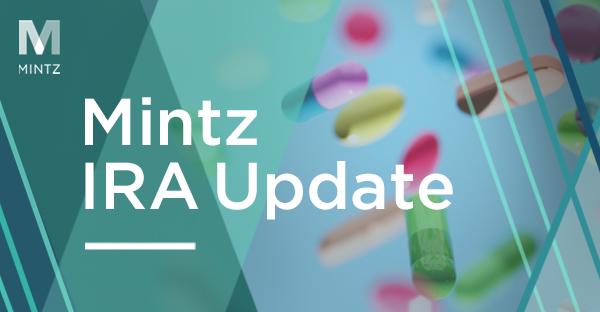
Health Care
Viewpoints
Filter by:
California Health Care Legislative Update: Fall 2023
November 7, 2023 | Blog | By Lara Compton, Pat Ouellette, Kathryn Edgerton
Governor Newsom signed 890 bills and vetoed 156 bills in 2023. Every year, California passes multiple laws that impact health care practitioners and health facilities and, as further described below, 2023 is no exception. From physician assistant supervision to nursing facility informed consent requirements, these laws will present various new compliance considerations for health care practitioners and health facilities as soon as January 1, 2024.
Read more
HHS Proposes Appropriate Disincentives for Health Care Providers That Commit Information Blocking
November 6, 2023 | Blog | By Pat Ouellette, Rachel Yount
In coordination with the Centers for Medicare & Medicaid Services (CMS), the Department of Health and Human Services (HHS) and Office of the National Coordinator for Health Information Technology (ONC) proposed a much-anticipated framework to establish and manage “appropriate disincentives” for health care providers under the Information Blocking Rules. As described in more detail in the blog post, the proposed rule (Appropriate Disincentives Proposed Rule) includes proposed disincentives for (i) hospitals and critical access hospitals (CAHs) participating in the Medicare Promoting Interoperability Program; health care providers eligible for Merit-Based Incentive Payment System (MIPS) adjustments; and health care providers participating in the Medicare Shared Savings Program (MSSP).
Read more
Biden Executive Order Calls for HHS to Establish Health Care-Specific Artificial Intelligence Programs and Policies
November 2, 2023 | Blog | By Pat Ouellette, Lara Compton, Madison Castle
On October 30, 2023, the Biden Administration released and signed an Executive Order on the Safe, Secure, and Trustworthy Development and Use of Artificial Intelligence (Executive Order) that articulates White House priorities and policies related to the use and development of artificial intelligence (AI) across different sectors, including health care.
Read more
OIG Issues Unfavorable Advisory Opinion on Free Items to Patients Tied to Reimbursable Services
November 1, 2023 | Blog | By Rachel Yount
Perhaps, unsurprisingly, the Office of Inspector General for the Department of Health and Human Services (OIG) rejected a manufacturer’s proposal to provide free hearing aids to certain patients if they receive one of the manufacturer’s cochlear implant devices (Proposed Arrangement). In reaching its determination, the OIG reiterated its longstanding concern about free items or services to Medicare and Medicaid beneficiaries because such arrangements could result in steering and unfair competition. Of note, the free hearing aids have a retail value of $1,180 to $2,240 which far exceeds the $570 limit imposed under the only potentially relevant safe harbor – the patient engagement and support safe harbor.
Read more
Guidance from FDA Clarifies a Key Issue for Industry: Non-Promotional Presentations About Unapproved Uses of Medical Products Can Be Produced by the Products’ Sponsors Without Violating Off-Label Rules
October 30, 2023 | Blog | By Joanne Hawana
U.S. health care attorneys, investors, and industry stakeholders are very familiar with the well-worn mantra that prescription drug and medical device companies are not allowed to “market” or “promote” their otherwise-authorized medical products for unapproved uses, also known as “off-label” uses. Over the past decade or so, this strict rule has been the subject of significant litigation and administrative proceedings seeking to disrupt and ultimately soften the government’s position in this long-standing, complex balancing of competing interests. What has been emerging is a more nuanced modern regime in which a drug or device sponsor’s First Amendment rights to speak responsibly and in a non-promotional way about its own products – as well as health care providers’ interests in gaining access to such information directly from the product sponsor to enhance patient care – are gaining greater recognition than ever before.
Read more
Telehealth Update: DEA Extends Flexibility in Prescribing Controlled Substances via Telehealth Through 2024
October 24, 2023 | Blog | By Cassandra Paolillo, Stephnie John
On October 10, 2023, the Drug Enforcement Administration (DEA) published another temporary rule extending the COVID-era telemedicine flexibilities that allow physicians and other prescribers to prescribe controlled substances without an in-person evaluation. With just over a month to go before the expiration of the first set of flexibilities, the DEA announced that the telemedicine flexibilities, which have been in place since March 2020, will be extended through the end of 2024 in order to give the agency more time to consider feedback received in response to the proposed rule, which was announced in March of this year. As a reminder, under the Ryan Haight Online Pharmacy Consumer Protection Act of 2008, providers may not prescribe controlled substances without an in-person visit, unless an exception applies. The COVID public health emergency triggered one such exception, which lead to the telehealth flexibilities.
Read more
OCR Cybersecurity Newsletter Emphasizes Significance of HIPAA Sanction Policies
October 23, 2023 | Blog | By Pat Ouellette
The Office for Civil Rights (OCR) recently offered covered entities and business associates (Regulated Entities) not-so-subtle reminders in its October 2023 Cybersecurity Newsletter that effective sanction policies can encourage HIPAA compliance. Regulated Entities are required by HIPAA to implement sanction policies in which they impose “appropriate sanctions” against their respective workforce members who fail to comply with the Privacy Rule or Security Rule, the Regulated Entity’s privacy policies and procedures, and/or the Regulated Entity’s security policies and procedures, as applicable. These sanction policies are important administrative safeguards meant to ensure there are objective, documented consequences for HIPAA non-compliance among workforce members. The recent proliferation of social engineering attacks and increasingly sophisticated nature of external cybersecurity threats in health care underscore the importance of Regulated Entities consistently reviewing and applying sanction policies.
Read more
California Revises Proposed Regulations for the Pre-Closing Review of Health Care Transactions: Public Comment Period Ends October 17, 2023
October 12, 2023 | Blog | By Lara Compton, Deborah Daccord, Daniel Cody
California’s new Office of Health Care Affordability (OHCA) is set to begin advance regulatory review of certain health care transactions beginning January 1, 2024. As further explained in our previous post, subject to certain exceptions, third party payers and administrators, hospitals, hospital systems, fully integrated delivery systems, pharmacy benefit managers, physician organizations, and other providers (collectively, Health Care Entities) will soon be subject to potential prospective transaction review. OHCA initially published proposed regulations for the new transaction review process in early August (for more details, see our prior post and our podcast). Multiple stakeholders expressed concerns with the proposed regulations during the public comment period, which ended August 31, 2023. In response to these comments, OHCA has published revised proposed regulations (Revised Regulations) allowing for an abbreviated comment period that ends October 17, 2023. The Revised Regulations are available here.
Read more
California Legislative Update: Reproductive and Gender Affirming Care Rights and Protections
October 11, 2023 | Blog | By Lara Compton, Kathryn Edgerton, Daniel Cody
Governor Gavin Newsom recently signed multiple bills into law as part of California’s ongoing efforts to safeguard access to reproductive and gender affirming health care. The new laws are intended to increase protections for health care providers and patients, increase health care provider availability, and improve patient privacy. In a recent press release, California Legislative Women’s Caucus Vice Chair Assemblymember Cecilia Aguiar-Curry noted: “Last year, we enacted 14 bills and budget funding to expand and protect reproductive rights and services in our state. This year, we build on that momentum with legislation that ensures California remains a national leader in the fight for reproductive justice.”
Read more
Court Strikes Down HHS Rule on Copay Accumulators: Implications for Health Plans and PBMs
October 9, 2023 | Blog | By Theresa Carnegie, Xavier Hardy, David Gilboa
In a significant development with far-reaching implications for health plans and pharmacy benefit managers (“PBMs”), Justice John D. Bates of the U.S. District Court for the District of Columbia has recently struck down a federal rule that allowed health plans to use copay accumulator programs to exclude drug manufacturer copay assistance from a patient’s out-of-pocket costs. This ruling has significant implications for the way health plans and PBMs operate and interact with patients and copay assistance programs.
Read more
Courts Continue to Grapple with the Causation Standard for False Claims Act Suits Based on Alleged Kickback Schemes, While the Supreme Court Stays on the Sidelines
October 5, 2023 | Blog | By Brian Dunphy, Grady Campion, Melody Mathewson
A recent Massachusetts Federal District Court decision adds to divergent opinions deciding an important health care enforcement question: what causation standard applies to a False Claims Act (FCA) case based on a violation of the Anti-Kickback Statute (AKS)? The AKS states that a claim that includes items or services “resulting from” a violation of the AKS constitutes a “false or fraudulent claim” under the FCA. 42 U.S.C. § 1320a-7b(g). On September 27, 2023, Chief Judge Saylor of the District of Massachusetts issued a decision in United States v. Regeneron Pharmaceuticals, Inc., C.A No. 20-11217-FDS, which adopted a “but-for” standard of causation applicable to the AKS’s “resulting from” language.
Read more
Things to Consider When Determining the Regulatory Requirements for Software (Hint: It’s More Than the Device Classification)
October 4, 2023 | Blog | By Benjamin Zegarelli
The capabilities and sophistication of digital health technologies are constantly expanding, especially with the integration of artificial intelligence and machine learning. Many companies, both existing and start-up, are developing software aimed at health care systems, hospitals, physicians, and lay-users for various levels of use, from assisting diagnoses in a clinical environment to tracking exercise and general health indicators in the home. In particular, a growing number of companies is focusing on the development of digital therapeutics - a class of software devices that deliver and monitor medical interventions for the purpose of treating, managing, or preventing certain diseases or conditions - for use in a patient’s home. With all of the new players jumping into the digital health technology game, we thought it might be useful to provide a brief primer on certain factors to consider when evaluating the potential regulatory requirements for such products.
Read more
OIG Issues Advisory Opinion Nixing Purchased Services Arrangement Between Certain Anatomic Pathology Laboratories
October 3, 2023 | Blog | By Karen Lovitch, Samantha Kingsbury
Last week the Office of Inspector General for the U.S. Department of Health and Human Services (OIG) issued Advisory Opinion 23-06 (AO), which advised that a proposed arrangement between certain laboratories for the purchase of the technical component (TC) of anatomic pathology (AP) services (Proposed Arrangement) could generate prohibited remuneration under the federal Anti-Kickback Statute (AKS) and thus be grounds for the imposition of sanctions. As we discuss below, this AO was notable because the OIG’s decision seems to be driven by its views on the (lack of) commercial reasonableness of the arrangement and its skepticism regarding arrangements that “carve out” federal health care program business.
Read more
Five Topline Takeaways from FDA’s Proposed Rulemaking on Lab-Developed Tests
October 2, 2023 | Blog | By Joanne Hawana, Benjamin Zegarelli
It came as a surprise to nobody in health care circles when, on Friday, September 29, 2023, the Food and Drug Administration (FDA) publicly announced that its much-anticipated proposed rule on laboratory developed tests, or LDTs, had made it through internal regulatory review processes and would be published imminently in the Federal Register. The agency moved very quickly following the White House Office of Management and Budget’s clearance of the rule, which had occurred just two days prior, likely due to the high probability that the federal government was going to shut down on October 1 if Congress did not come to a budget agreement. That shutdown was narrowly averted over the weekend, but had it not been, the last significant publication of the Federal Register would have been on Tuesday, October 3.
Read more
FTC Follows Through on Promise to Roll Over Health Care Roll Ups
September 26, 2023 | Blog | By Bruce Sokler, Joseph Miller, Payton Thornton
Since the beginning of Chair Khan’s tenure at the Federal Trade Commission (and in line with President Biden’s aim to curb rising health care costs), the current FTC has committed to bring enforcement actions against health care consolidation and rising prices. Over the past two years the FTC has employed novel competition tools to achieve this purpose, as demonstrated by the Commission’s suit last week against a private equity firm and its related specialty practice—alleging violations of Sections 1 and 2 of the Sherman Act, Section 7 of the Clayton Act and Section 5 of the FTC Act.
Read more
Mintz IRA Update — A Timeline of the IRA’s Major Milestones
September 20, 2023 | Blog
Mintz IRA Update — The First Anniversary of the Inflation Reduction Act: A Year in Review
September 20, 2023 | Blog
Mintz IRA Update — Legal Challenges to the Medicare Drug Price Negotiation Program
September 20, 2023 | Blog
Mintz IRA Update — Basics of the Medicare Drug Price Negotiation Program
September 20, 2023 | Blog
Explore Other Viewpoints:
- Antitrust
- Appellate
- Arbitration, Mediation & Alternate Dispute Resolution
- Artificial Intelligence
- Awards
- Bankruptcy & Restructuring
- California Land Use
- Class Action
- Complex Commercial Litigation
- Construction
- Consumer Product Safety
- Cross-Border Asset Recovery
- Debt Financing
- Direct Investing (M&A)
- Diversity
- EB-5 Financing
- Education & Nonprofits
- Employment
- Energy & Sustainability
- Environmental Enforcement Defense
- Environmental Law
- FDA Regulatory
- Federal Circuit Appeals
- Financial Institution Litigation
- Government Law
- Growth Equity
- Health Care
- Health Care Compliance, Fraud and Abuse, & Regulatory Counseling
- Health Care Enforcement & Investigations
- Health Care Transactions
- Health Information Privacy & Security
- IP Due Diligence
- IPRs & Other Post Grant Proceedings
- Immigration
- Insolvency & Creditor Rights Litigation
- Institutional Investor Class Action Recovery
- Insurance & Financial Services
- Insurance Consulting & Risk Management
- Insurance and Reinsurance Problem-Solving & Dispute Resolution
- Intellectual Property
- Investment Funds
- Israel
- Licensing & Technology Transactions
- Life Sciences
- Litigation & Investigations
- M&A Litigation
- ML Strategies
- Medicare, Medicaid and Commercial Coverage & Reimbursement
- Mergers & Acquisitions
- Patent Litigation
- Patent Prosecution & Strategic Counseling
- Pharmacy Benefits and PBM Contracting
- Portfolio Companies
- Privacy & Cybersecurity
- Private Client
- Private Equity
- Pro Bono
- Products Liability & Complex Tort
- Projects & Infrastructure
- Public Finance
- Real Estate Litigation
- Real Estate Transactions
- Real Estate, Construction & Infrastructure
- Retail & Consumer Products
- Securities & Capital Markets
- Securities Litigation
- Special Purpose Acquisition Company (SPACs)
- Sports & Entertainment
- Strategic IP Monetization & Licensing
- Tax
- Technology
- Technology, Communications & Media
- Technology, Communications & Media Litigation
- Trade Secrets
- Trademark & Copyright
- Trademark Litigation
- Venture Capital & Emerging Companies
- White Collar Defense & Government Investigations
- Women's Health and Technology











